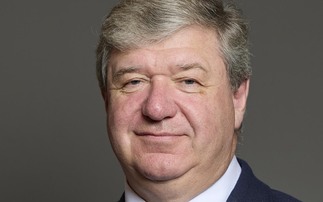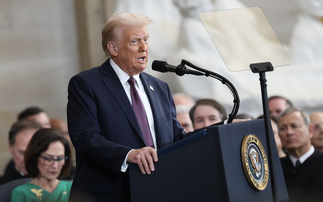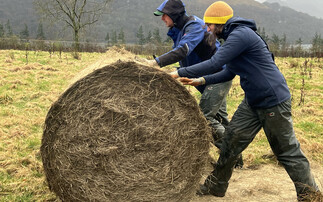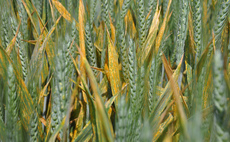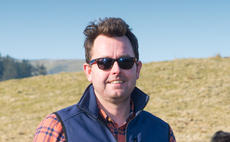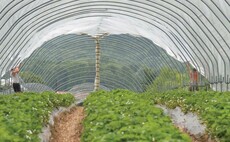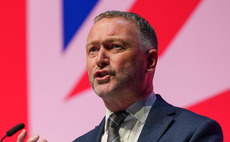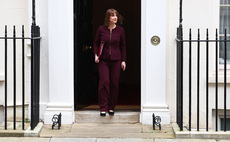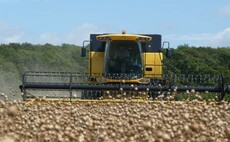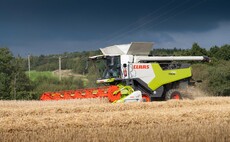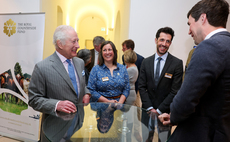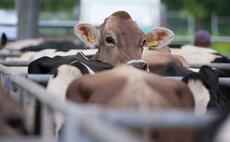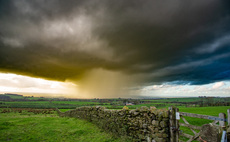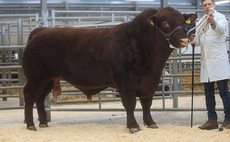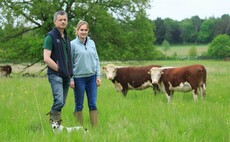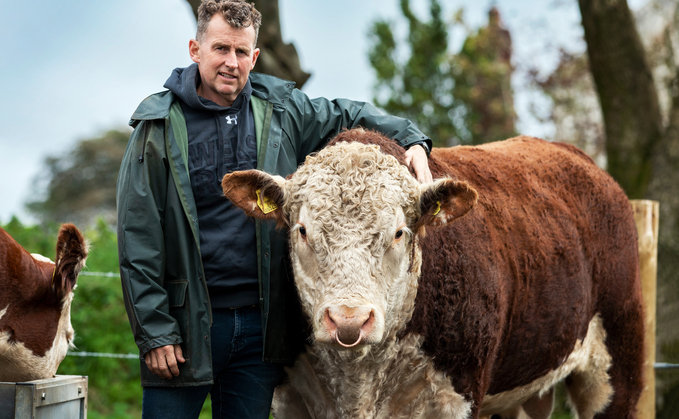
Íæż½ã½ã's chief reporter Rachael Brown sits down with former international rugby referee turned farmer, Nigel Owens, to talk about the challenges facing farmers right now, the threat of bovine TB in Wales and calls for 'honest and balanced discussions' around wildlife. He also gives his prediction on who will win the Rugby World Cup.
Nigel Owens feels right at home on his farm nestled in the Gwendraeth valley in Carmarthenshire. Becoming a farmer was a complete product of his own hard work and he has an unrivalled sense of passion and pride for the industry which he nurtured from a young age, helping out at his auntie and uncle's farm.
Despite not having farming parents, Nigel still affectionately describes farming as ‘being part of his blood', proudly sharing how when he left school, he went on to work at a dairy farm close by.
Hereford cattle
It was there where his love for livestock started. From humble beginnings growing up on a council estate in West Wales, Nigel now has an 80-cow pedigree Hereford herd with more than 36 hectares (90 acres), all of which would have not been possible without the career which came before it, as a well-respected and rather famous rugby referee.
It was never the plan to become a referee, never mind an internationally renowned one, praised by many rugby fans as one of the most successful referees the game has ever seen.
But when asked what moment he was prouder of - refereeing the rugby world cup final in 2015 or watching his first Hereford calf born on-farm - he was unable to choose.
He is quick to praise his previous life on the field, reiterating the fact that without his rugby career he would never have been able to turn his farming dream into a reality.
He says: "If you had to give me the choice now, between walking out into that field among my Herefords on a lovely summer's evening or on a field in front of 85,000 people booing and shouting me, I think you would know what the answer would be.
"I enjoyed my time as a referee. It has given me opportunities over the years to save up and have this farm. But if they asked me to come back and referee the World Cup final in three months' time, I would say ‘no thank you, I am very much happy where I am, here on the farm'."
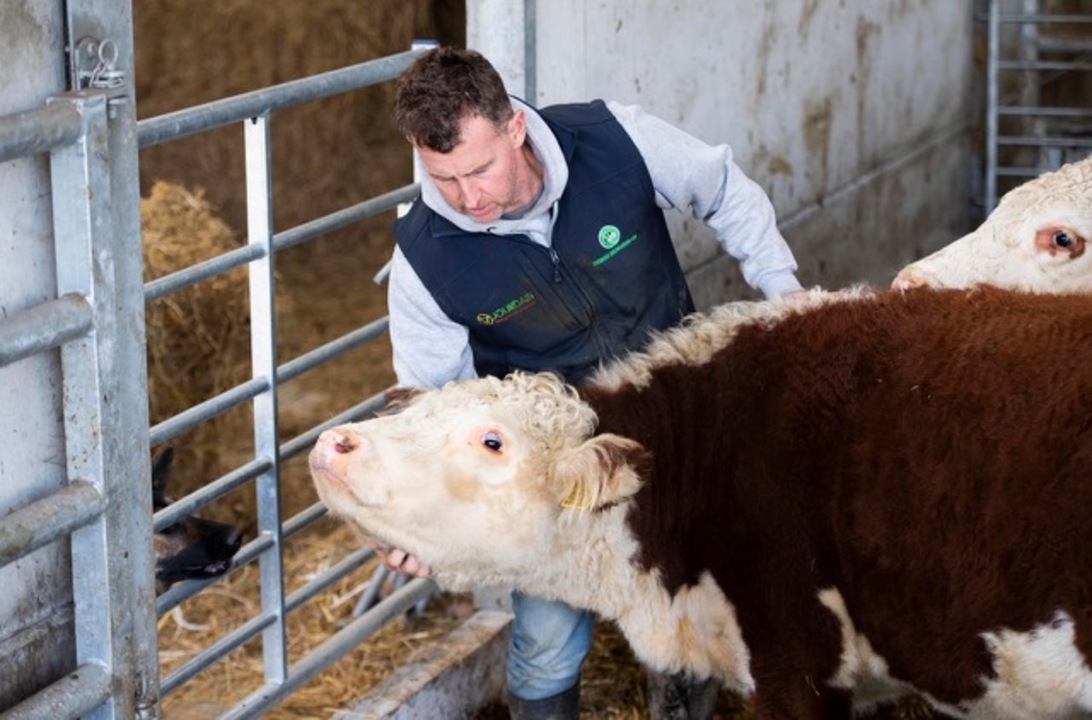
Nigel understands the power of politics in shaping Welsh farming both now and in the future, and he is determined to ensure the voices of the farming and rural community are heard and protected.
Bovine Tuburculosis
When it comes to bovine TB (bTB), Nigel does not hold back on his views, echoing the frustrations of many Welsh farmers with the lack of balanced discussion in the role in which wildlife has to play in the spread of bTB across the country.
He criticised the Welsh government for being too pre-occupied and concerned with ‘securing votes within the city' and consequently neglecting rural and farming communities.
Farming in a country where badger culling is not allowed, this is, he says, precisely where the Government has got it wrong. He says wildlife needs to be part of the conversation, alongside biodiversity and cattle movement.
Nigel says: "Unless you are willing to have an open and honest discussion about everything which contributes to an issue, there is no way you can go about dealing with it properly.
"We are all part of the solution; it is not just farmers and the people who fight for wildlife. I am all for wildlife; it is hugely important to me and many farmers. But unless you have an honest conversation about the reality of the issue contributing to the spread of bTB then it is just going to be an endless circle."
Commenting on the need to broaden the Welsh TB policy and criticism of emotional attachment on one side of the argument, Nigel linked back to the skills needed to referee a rugby match.
He says if New Zealand and Portugal were playing one another, Portugal would be the underdogs and from a neutral fan perspective the romance of the contest would be for Portugal to win.
"As a referee, I have to detach myself emotionally from that romance and referee the game in front of me."
Social media
When it comes to polarised debates, social media is increasingly becoming a platform to air these conversations.
Nigel agrees that with the backdrop of climate change, farming has been getting a hard time, with the industry forced to ‘defend itself' daily from unsubstantiated facts and misinformation.
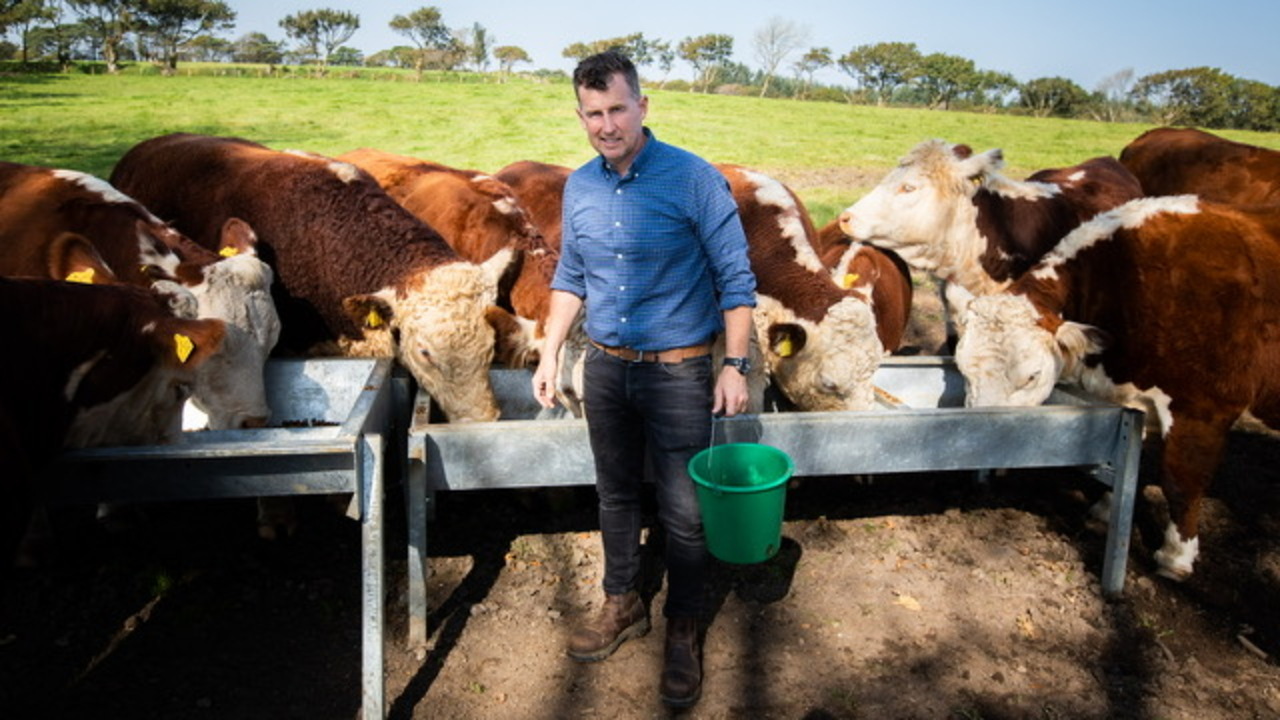
Nigel warns government agricultural policies are taking valuable land away from farmers and food production which could have long term implications on the ability to feed people.
"If they are not careful in 10 years or 20 years' time we are going to see famine all across the world because people will not be producing food anymore," he said.
Food security
He says he is fully supportive of Welsh Government's policy to plant trees to ‘contribute to a better and green environment', but reiterated it must be done in a ‘balanced way'.
He says ‘it is wrong' when trees are planted on land that could otherwise be used for food production.
He believed too many people are happy to ‘import food from countries across the world' rather than buy home grown food.
Frustrated by the thought he continued to say these countries where food is imported from have lower animal welfare and human rights and perform poorly when it comes to climate change.
He says some people in today's society would prefer to do that and ‘blame the 20 cows grazing naturally on the field out here.'
He believed ‘education is important', but was concerned that too many people are ‘blinkered and emotionally attached to their views' there is no chance of having a honest discussion about farming.
He is concerned by the ‘huge amount of fake information' on social media is contributing to an ‘inability to have an honest debate.'
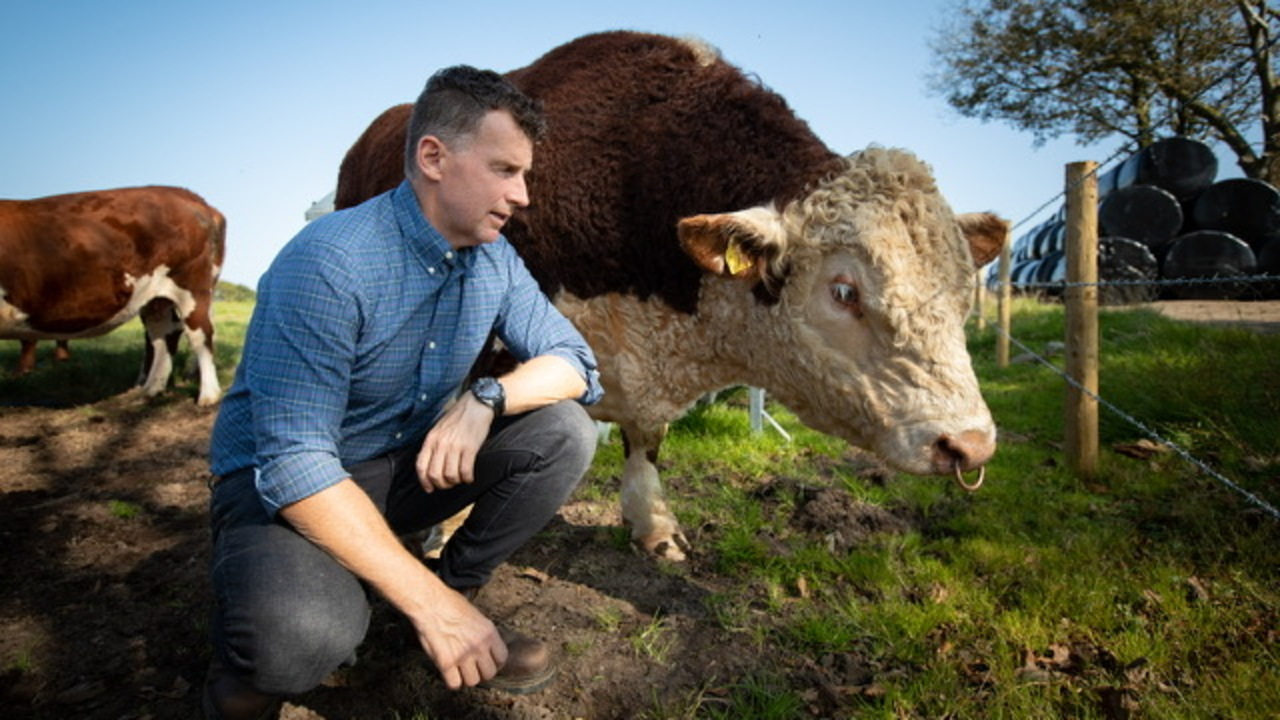
"You have then empty vessels that I call them that bang on a drum on something that is not accurate information and they do not know what it is all about.
"They do not live in the real world sometimes. So you have people passing comments on agriculture and the farming way of life who live in a flat in the city who have never been in the countryside.
"The guardians of the countryside who contribute hugely to keeping the countryside safe, encouraging wildlife, looking after the countryside, are the farmers. But people do not seem to see that."
Jeremy Clarkson
Nigel praises the work of TV presenter turned farmer Jeremy Clarkson and his trusted colleague Kaleb Cooper for the TV series Clarkson Farm and its work in promoting British farming and the reality of the constant pressure farmers are under.
He says: "I have never been a Clarkson fan or anti-fan and I do not really have any views on him. All I can say is his farming programme has highlighted a lot of issues and done a huge amount of good for the farming community."
When asked if he would ever explore something similar to Clarkson's Farm, Nigel laughs but does not reject the thought of the idea completely.
If a TV series does not appeal, Nigel is certainly someone who is wanting to stand up for the industry and correct misinformation where needed.
He believes farmers can learn a lot from French farmers when standing up for themselves and promoting the community.
Misinformation
He says: "I am certainly not going to stand by or say nothing when I see wrong being done or misinformation on whatever side of the conversation it is.
"I will listen to the point of view, but also stand up to people who spell out misinformation and who are blinkered in their views."
When asked about the future of farming, Nigel is honest of the challenges the community faces, but reiterates the need for all farmers ‘to pull together' and highlight the importance of farmers and their role in producing food for the nation. He says ‘now more never' is the time for farmers to do this.
For Nigel and his own farm, he is happy to keep the size of the herd where it is, possibly exploring options of showing his cattle in the not-so-distant future.
He admits he naturally has favourites on the farm, from the very first heifer which was born to the cow which is struggling to get in-calf and which is on its final try. But despite his favourites, he says none of them got any extra feed.
Nigel clearly has a love for Herefords, but interestingly he says that if all of his other commitments outside farming did not exist, he would not rule out the possibility of returning to where it all started for him: back in the milking parlour on a dairy farm.










